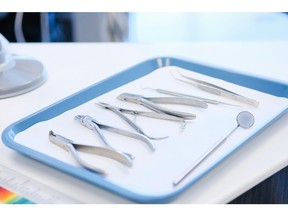Dentists can bill for federal dental plan without opting in
Health Canada clears up misconceptions about federal plan in open letter to dental providers

Article content
The federal government has sent an open letter to dentists to correct misconceptions about its new dental-care plan, including having to opt into the program.
Advertisement 2
Story continues below
Article content
Health Canada published the letter on LinkedIn as a way of clearing up dentists’ concerns about the new Canadian Dental Care Plan. The feds had previously said dental providers would have to opt into the program in order to bill the plan.
Many New Brunswick dentists disapproved of the plan. Paul Blanchard, executive director of the New Brunswick Dental Society, said in a recent interview the biggest reason dentists weren’t interested was the additional processes and paperwork the program would create.
Dentists’ offices would have to confirm if the patient was eligible for the program and which dental work and treatments were approved under the plan, and determine the proper billing. Sometimes it could cause delay for patients needing treatment because the dental offices need to confirm the procedures are covered, said Blanchard.
Blanchard said in an email on Thursday there had been no direct correspondence between the dental society and Health Canada, but he was aware of the open letter and planned to share it with members.
The dental society had surveyed its members, and out of the 47 per cent who responded, 78 per cent said they would not participate in the new federal plan. Blanchard said he was aware of two New Brunswick dentists who chose to opt into the plan, but noted it is difficult to get accurate numbers from the SunLife website – the provider chosen to administer the plan.
“While there are a lot of reasons for this, the administrative burden associated with the plan is an important factor,” he said.
Article content
Advertisement 3
Story continues below
Article content
The open letter stated one of the misconceptions was that being a dental plan provider would impose a burden on dental offices. The federal government said dental offices can submit digital dental plan claims in the same way they submit claims for private insurance plans through existing software.
“We have made it as easy as possible for you to submit claims and receive accurate and fast reimbursement,” said the government, noting dental providers will be able to sign up for electronic funds transfer on Sun Life Direct to receive claim payments by direct deposit within 48 hours initially, with a goal of a 24 hour turnaround time.
“In choosing to participate, oral health care providers continue to conduct business as they currently do, including determining their own capacity and building relationships with patients.”
Health Canada said in the letter there is no calculation required by the providers or staff related to the costs that will be covered or not covered under the plan. Dental offices will submit the amount billed, like for other plans. Sun Life will provide an explanation of benefit “almost instantaneously” to indicate the amount that will be reimbursed by the dental plan.
Canadians with an adjusted annual family net income of less than $70,000 will have no co-payment; Those with an adjusted annual family net income between $70,000 and $79,999 will have a 40 per cent co-payment; and those with an adjusted annual family net income between $80,000 and $89,999 will have a 60 per cent co-payment, according to the federal government.
Advertisement 4
Story continues below
Article content
It’s available to all Canadians with no access to dental insurance with a family net income of less than $90,000 who have filed their tax return in the previous year.
Applications first opened for seniors aged 87 and older in December, then expanded to those aged 77 to 86 in January, followed by those aged 72 to 76 in February, and then those aged 70 to 71 in March.
The federal government has said Canadians with a valid Disability Tax Credit certificate, and children under the age of 18 will be able to apply online starting June 2024. All remaining eligible Canadian residents between the ages of 18 and 64 will be able to apply online starting in 2025.
There's a lot of confusion
Paul Blanchard
One of the biggest stressors for the dental society is misinformation for clients. Patients have been calling dental offices looking for free dental care and dental implants, said Blanchard.
“There is a lot of confusion regarding what will be available and what will not, and that responsibility of answering patient questions is being placed on the dental offices, which is causing a lot of concern,” he said.
Patients who choose to register with the plan are informed that the fees for dental services may be more than what is covered under the federal plan, said the federal government.
“Even when patients have to pay additional charges, the CDCP will still result in significantly lower costs for them, compared to what they face now without any dental coverage,” said Health Canada in the letter.
Advertisement 5
Story continues below
Article content
Most services will not require preauthorization, but for those that do Health Canada said it is committed to standardizing the preauthorization process with the goal of reducing the administrative burden on staff.
Starting in November 2024, preauthorization requests can be submitted electronically and will allow attachments and digital x-rays.
Blanchard said though Health Canada has told people the plan will be ready in May, many components of it are still being developed.
“While this seems to be playing out, we would like to see Health Canada better manage the communication around their plan, so that we can all better manage patient expectations and not place this burden at the feet of front-line staff in the dental office,” he said.
For those offices that choose not to participate, Health Canada said as of July 8 if a dental provider has not already opted into the plan, they will be able to treat clients who have registered for the plan, and bill Sun Life for services provided on a “claim-by-claim basis.”
Blanchard said the dental society has not yet been informed of the process for the claim-by-claim option, as long as the provider agrees to direct bill Sun Life for services provided under the plan.
Dental providers can end participation at any time by calling Sun Life or ceasing to submit claims under the dental plan with no penalty for withdrawing from participating, said the federal government.
Simultaneously, the dental field is facing a growing population in New Brunswick, increasing the demand for dentists, as well as a shortage of dental professionals. Blanchard said many dental offices are not taking new patients, especially in northern New Brunswick. There is also an aging population of licensed dentists with 40 per cent over the age of 50.
Advertisement 6
Story continues below
Article content
Christopher Aun, spokesperson for federal health minister Mark Holland’s office, said in a statement the dental plan is the largest program rollout in the country with over 9 million Canadians set to benefit when it is fully implemented.
“We have heard of some common misconceptions about the program circulating, and issued this letter, so providers have the accurate information needed to make a decision on their participation in the CDCP and in supporting CDCP patients,” said Aun in the statement.
So far, 5,000 oral health professionals have indicated their participation in the dental plan across the country.
Aun said the federal government is taking “a number of actions” to get more dental professionals to participate in the plan, with a goal of making it easier for them to support their patients.
The fact that dental professionals will be able to bill Sun Life on a claim-by-claim basis would make it simpler for dentists to treat patients and that clients who have signed up for the plan can see any provider they choose for their care.
“This addresses one of the biggest concerns of providers, and we are confident that most providers across the country will see members of the CDCP with this new option,” said Aun.
As the rollout continues Holland is meeting with dental associations to have “positive and productive” conversations about the plan.
Article content












Postmedia is committed to maintaining a lively but civil forum for discussion. Please keep comments relevant and respectful. Comments may take up to an hour to appear on the site. You will receive an email if there is a reply to your comment, an update to a thread you follow or if a user you follow comments. Visit our Community Guidelines for more information.